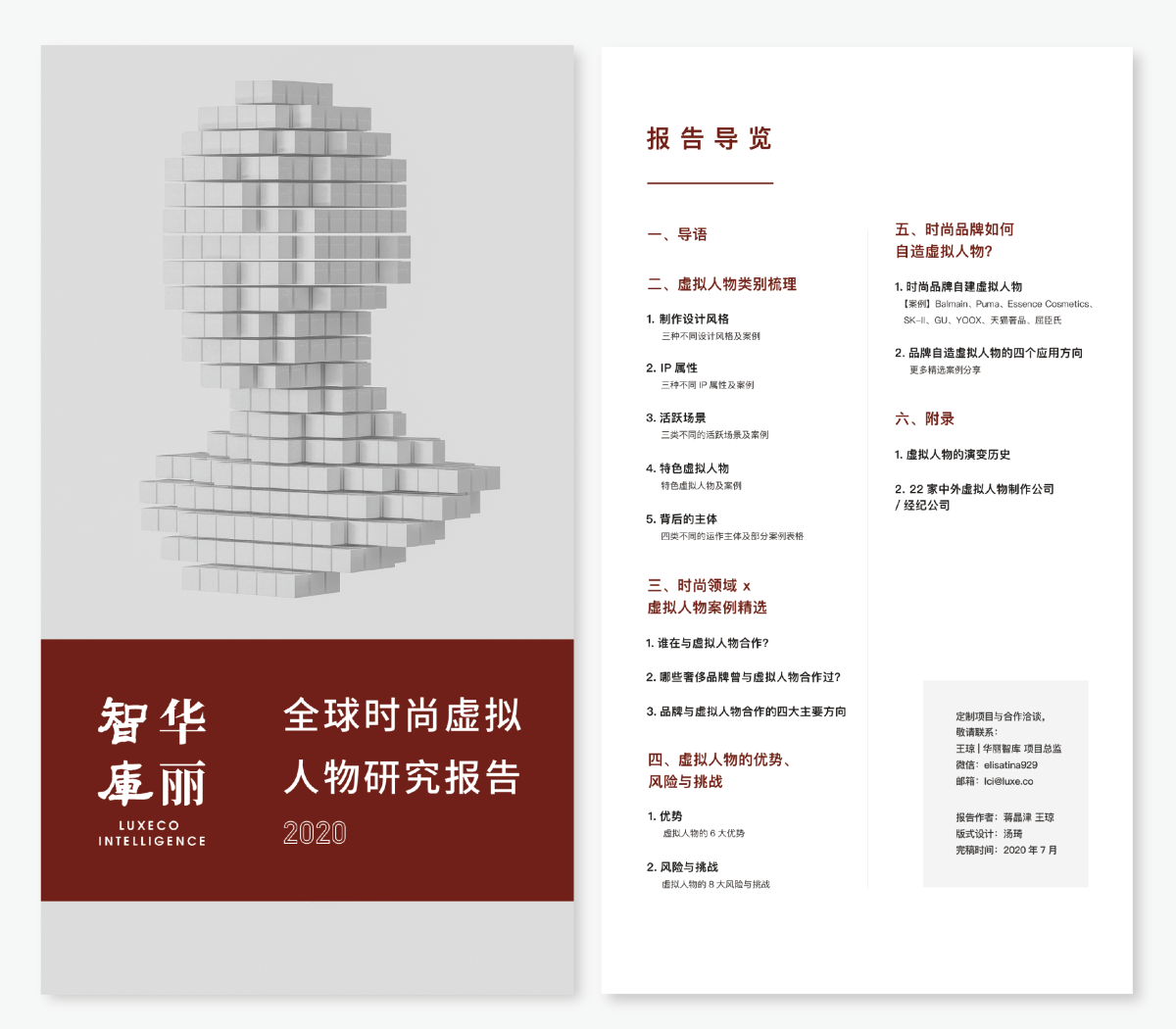LuxeCO Intelligence: Behind the "Halo" of Virtual Fashion Idols
August 10,2020
This is a historic moment when the boundary between real and virtual is becoming blurred, with the birth of an enormous wave of "virtual idols" and the popularization of applications. This phenomenon is constantly fermenting and magnifying due to the pursuit of media from all sides.

For fashion and luxury brands that are eager to talk to the new generation of consumers, "virtual idols" with a halo are becoming another important option for cooperation besides celebrities.
- In June, in the online showroom especially created by the French luxury brand, Balmain, there was a special host and guide, a virtual clone of creative director, Olivier Rousteing, responsible for telling the audience about the design stories and ideas behind the vacation series.
- In July, French luxury brand, Givenchy, announced a collaboration with China's virtual idol group, WU XIAN WANG ZHE TUAN, to wear the brand's 2020 Tanabata limited series, appear on the cover of fashion magazines, and take over the brand's official Weibo account.
- The number of virtual characters in China's fashion industry has risen rapidly in the past two years, with various forms of cooperationтІтІ
Although the advantages of virtual characters, such as a perfect appearance, highly controllable, highly topical, easily accepted by the younger generation, etc., are obvious, there are also many challenges and risks hidden behind the shining halo of this new phenomenon.
Jennifer Grygiel, professor of social media at Syracuse University, acutely pointed out, "(Most virtual characters) are indistinguishable from real people, and they are also difficult to distinguish from social media content. This concept is very problematic."
Six major risks related to this were summarized in the "Global Fashion Virtual Character Research Report", which contained the latest results of тLuxeCO Intelligenceт research, for example:
- Uncanny Valley Theory
The Uncanny Valley theory is the result of a hypothesis proposed by the Japanese robotics expert, Masahiro Mori, in 1970 of how humans feel about robots and non-human objects. The term, "Uncanny Valley", was proposed in a 1906 paper, "On the Psychology of the Uncanny", by Ernst Jentsch, whose views were cited by Sigmund Freud in a 1919 paper entitled "The Uncanny". The specific content of the Uncanny Valley theory is that, if a robot or doll has an appearance that is remarkably similar to a human, humans will treat it with extreme disgust and fear. For example, when the Swedish supermarket chain, Ica, introduced the world's first virtual baby, Elis, it had Т similar problems.
- Legal risks such as intellectual property rights
Since a whole production team or hired staff are responsible for virtual characters, as a form of IP (Intellectual property) product, how can their owner (s) be identified?
Who or what inspired the creation of virtual characters? If these characters have prototypes in real life, there may be a potential risk of infringement of personal portrait rights. Besides, it is natural for creators to hope to obtain the rights and interests of all products related to the virtual character, whether they cooperated with external virtual characters or incubated virtual characters inside the brand for external cooperation. Therefore, cooperation will involve legal risks associated with intellectual property rights, such as the complex ownership of a cooperative product between the brand and the creator.
- Identity
Vanitha Swaminathan, a professor of marketing at the University of Pittsburgh, believes that it is sometimes difficult for consumers to distinguish virtual characters with a real appearance and this will damage the relationship between consumers and brands in the long term because it will not only cause serious ethical problems, but also legal challenges.
Bryan Gold, CEO of creator media platform #Paid, pointed out, тThe end consumer does not even know if the virtual character enjoys this product, because he canтt try it. What if the recommended product is wrong? As a consumer, I cannot believe the use of moisturizing creams and lotions as described by the virtual characters."
- Potential impact on young people
Many professionals are afraid that virtual characters will have possible adverse effects on young people because these characters are near perfect in all aspects and the fan base is relatively young.
According to Michael Berry, who is a clinical psychologist, "The influence of virtual characters is worrying because it is an unrealistic 'fantasy' for young people, which may not be achieved in reality." He believes in letting тyoung people be exposed to as little as possible to CGI virtual characters, because they may influence or even mislead the thinking of young people. This is very scary."
- Challenges to sustainable operations
Some brands or companies have insufficient energy to run their virtual characters for a long period of time. The continuous iteration of the virtual set of characteristics also poses a challenge to the brand, because the related artificial intelligence technology covers multiple fields, including text, voice, and images, and requires continuous creative input.
- Character settings may cause disputes
Virtual characters are active on various platforms, showing their personality and charm, but the audience at the other end cannot know the true purpose or identity of the creator behind them.
тІ тІ
The above content is taken from the latest "Global Fashion Virtual Character Research Report" released by тLuxeCO Intelligenceт.
LuxeCO Intelligenceт has studied global cooperation cases related to the use of virtual characters in the fashion industry in the past four years, during which it has covered 150 cooperation cases of 110 virtual characters, 100 luxury goods, fashion, beauty brands, and fashion retailers. Following Т screening, systematic sorting, and researching, this report was specifically launched to provide a comprehensive, objective learning and decision-making reference for professionals in the fashion industry and related technical personnel who are eager to understand and correctly apply "virtual characters".
PleaseТ click hereТ or scan the QR code in the picture above to download the Chinese report for a fee.Т
Report directory:

About LuxeCO Intelligence
тLuxeCO Intelligenceт is an information and consultancy service platform for the global fashion industry. It is based in China and provides forward-looking consumer insights, industry research, and strategic advisory services from in-depth industry perspectives based on a broad global vision.
Based on a continually expanding industry network, data intelligence, and knowledge system, Т тLuxeCO Intelligenceт is focused on the luxury, fashion, beauty, and lifestyle industries. It seeks to provide industry leaders with the best decision-making references due to its structured business information, systematic research on sub-industries, efficient first-hand research, rich case studies and forward-looking strategic thinking.












Comments